|
|
|
| My Favourite Planet > English > Europe > Greece > Macedonia > Stageira & Olympiada |
| Stageira & Olympiada |
History of Stageira & Olympiada - Part 6 |
|
 |
page 7 |
 |
|
| |

The uninhabited island of Kafkanas (Kapros), opposite Olympiada. See Olympiada gallery pages 2-3. |
| |
History of Ancient Stageira - Part 6
Macedonians, 4th century BC |
| |
While the states of central and southern Greece continued fighting among themselves, Macedon was gradually gaining power and influence in the north.
Before the Spartans had checked the expansion of Olynthos in 379 BC, the Chalcidian League had taken control of parts of Macedonia, including the capital Pella, despite the 50-year peace treaty it had made in 393 BC with the Macedonian king Amyntas III ([18] history part 3). It is perhaps surprising that there is so little information about the Olynthians and the Chalcidian League, since if they had not been stopped at this point, they may well have overrun Macedonia and parts of Thrace, and have changed the course of history.
The Macedonians also had to contend with threats from Thebans, Illyrians, Paionians, Thracians... as well as plans by the Athenians to install a pretender. As ever the Greek states schemed and fought to maintain a balance of power which they had long-since proved to be incapable of achieving.
Amyntas' son Philip II (ruled 359-336 BC), "looking, as from a watch-tower, for an opportunity to attack" [31], slashed through the age-old ruinous feuds and turned this status quo on its head by uniting and expanding Macedon, driving the Illyrians and Thracians back, conquering Halkidiki, and eventually becoming master of Greece.
In 348 BC Philip conquered Halkidiki, in the process destroying Olynthos and Stageira and selling their inhabitants into slavery. Luckily for Aristotle (see Olympiadas gallery page 5), he was not around at the time, being either in Athens or Atarneus, Asia. Plutarch tells us that when Philip appointed him tutor to his son, the young Alexander the Great in 343 BC, he had Stageira rebuilt and brought back its citzens from exile and slavery [32]. Pliny the Elder, on the other hand says that it was Alexander who had Stageira rebuilt [33].
It appears from Plutarch and other writers that Aristotle petitioned Philip or Alexander to rebuild his home town, was involved in its restoration, and even wrote its laws [34-36]. However, the political realities of refounding the city were a disappointment to him, and a far cry from his philiosophical ideals [37]. His disillusionment may be one of the reasons he chose to spend his last years in Chalcis rather in his hometown.
Halkidiki had become part of Macedonia, and Philip could add the mines around Stageira to those at Mount Pangaion, over which he had gained control after conquering Amphipolis in 357 BC. He, and later Alexander, now had access to large supplies of gold and silver to mint coins and finance their further political and military ambitions (see Big Money at the Cheshire Cat Blog).
The mines in the areas of Stageira and Stratoni (15 km south of Stageira) were worked intensively until around 300 BC, when it is thought that the groundwater level was reached and thus the limit of contemporary mining technology to make further ore excavation viable. From the volume of ancient slag discovered around the mines, it has been estimated that about 1 million tonnes of ore were extracted during this period. [See note 15 in History Part 3]
In September-November 1999, Dr. Kostas Sismanidis of the Greek Archaeological Service was able to make a brief investigation of the site of the ancient mines of Stageira, 2 kilometres west of Olympiada, before the controversial planned start of modern industrial mining. He discovered remains of Early Iron Age (10th century BC) settlements, as well as what he believes to be a Hellenistic walled city. Based on his investigation, Dr. Sismanidis believes that Stageira may have been rebuilt here, further inland than the original Archaic city and closer to the mines. [38]
What part the older city or the repatriated Stageirites played in this new economy remains unclear, however ruins of Hellenistic houses and a large, unidentified building from the Hellenistic period have been discovered there (see Ancient Stageira gallery pages 20 and 30-31). |
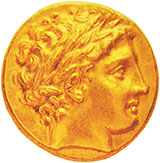
Gold stater of Philip II
of Macedon. Minted in
Pella, circa 323-315 BC.
Obverse: head of Apollo.
Bode Museum, Berlin.
photo: © David John |
| |
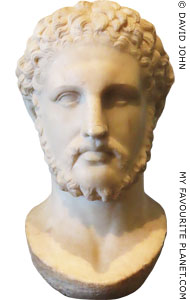
Marble statue head
believed to be a portrait
of Philip II of Macedon.
Roman period copy of a
4th century BC original.
Chiaramonti Museum,
Vatican Museums, Rome.
Inv. No. 1683. |
| |
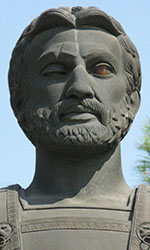
Philip II of Macedon.
Detail of a Modern
statue in Thessaloniki |
| |
| |
We hear even less about Stageira from the 4th century BC until the 20th century than the scanty evidence concerning the Archaic and Classical periods. However, there are three tantalizing legends connected with the city from the time of Alexander the Great (356-323 BC).
According to local folklore, the town of Satghara, in the Punjab, northwestern India (now in Pakistan) was founded around 325 BC by injured soldiers from Stageira who had served in Alexander's army. It is thought that the name Satghara may be a corruption of the name Stageira.
The second legend says that Alexander asked Aristotle to pick citizens of Stageira to colonize the island of Socotra, off the coast of Yemen in the Indian Ocean. This story is supported (though doubted by many scholars) by the narrative of the 12th century Moroccan geographer Muhammad al-Idrisi, who wrote that Alexander conquered the fabled island, following the advice of Aristotle to find the source of aloe production. [39] The island was known to the ancient Egyptians who prized the medicinal properties of its aloes and its frankincense which was used in religious ceremonies. Because of the commercial importance of these products, al-Idrisi tells us that after conquering Persia and parts of India, Alexander had Socotra's population driven away and replaced by Ionic Greek settlers who harvested the precious crops. The island was an important stopping-off point for ships and a trading centre between Africa, Arabia and southeastern Asia from prehistory. The Greeks are said to have been still living there in al-Idrisi's time, and had meanwhile become Christians. |
|
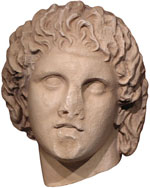
Alexander the Great.
4th century BC.
Pella Archaeological
Museum.
See Pella gallery. |
|
| |
The most intriguing legend is that Olympias (also known as Olympiada) [40], the fourth wife of Philip II and mother of Alexander the Great, was banished either to Stageira or the island of Kapros by Cassander, her rival for control of Macedonia, after he had defeated and captured her at Pydna in 316 BC. According to this legend, Olympiada was named after her (see also Olympiada gallery pages 2 and 3).
There appears to be no evidence to confirm this legend or testimony from ancient authors, from whom we learn merely that after her capture, Olympias was tried in her absence, since Cassander feared the effect the presence the mother of Alexander would have on the Macedonian assembly. He sent 200 soldiers to kill her, but overawed by her, they felt unable accomplish their mission. Finally Cassander is said to have set the relatives of those Olympias had killed to execute her, and refused her a burial. [41]
No mention is made of how long the process between Olympia's capture and execution took, or where she was imprisoned, although Diodorus Siculus wrote that the soldiers sent to kill her "entered the royal house". [41] If Cassander was worried about contact between her and other Macedonians, it seems unlikely that he would have kept her under house arrest at a royal palace in Pella or Aigai. He imprisoned Alexander's widow Roxana and their son Alexander IV, who he had also captured at Pydna, at Amphipolis, where he had them poisoned around 310 BC. Is it possible that he had Olympias incarcerated at a more out-of-the-way place like Kapros island?
Whatever the truth concerning this legend, the name of Olympiada is not a recent invention, and appears on historical maps (as "Lybiada" and other variants: Libiada, Limbaz, Livasdias, Lipsada, Lipsasa...), for example an Austro-Hungarian military map made in 1860-1870 (see map 5 in History part 8).
Inscriptions discovered in 1937 by Charles Edson at Makris Giallos, the site of ancient Pydna, have led to speculation by scholars that a tomb or monument may have later been dedicated to Olympias there. [42] |
|
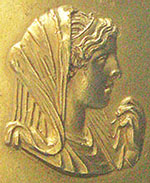
Detail of a medallion
thought to depict
Olympias [40] |
|
Dr. Sismanidis believes that Stageira may have flourished into the 1st century BC, after which, according to Strabo, the city was deserted. [43] The reason for its abandonment is unknown but it may be connected with the exhaustion of the mineral supplies or one of the many upheavals in the turbulent times following the death of Alexander and the conquest of Macedonia by the Romans in 168 BC.
Cassander became King of Macedonia, founding the short-lived Antipatrid dynasty. In 316 BC he rebuilt the ancient Corinthian colony Potidaia (Ποτίδαια) in southwest Halkidiki, which had been destroyed by Philip II. He renamed it Cassandreia (Κασσάνδρεια, Kassandreia), and settled the surviving population of Olynthos there. He also founded the city of Thessalonike, northwest of ancient Therme (Θέρμη), around 315 BC, naming it after his wife Thessalonike (Θεσσαλονίκη, Thessalian Victory), half sister of Alexander. He moved the inhabitants of several local towns to his two new cities. [44] |
|
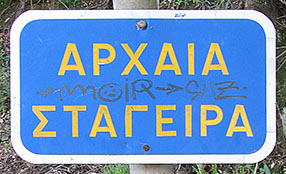 |
|
| |
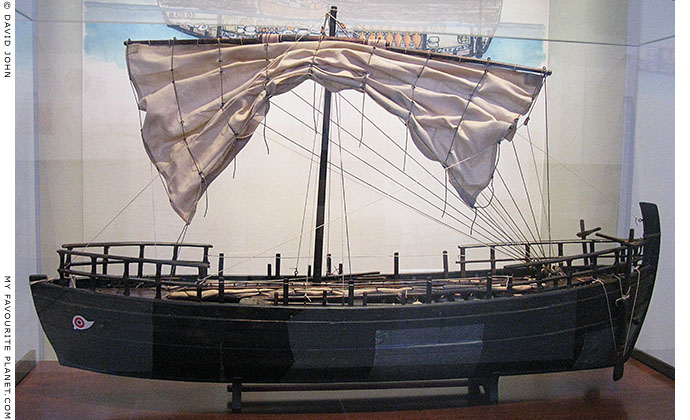
Model of a 4th century BC Greek merchant ship which was looted and sunk
by pirates off the coast of Kyrenia (Greek, Κερύνεια), northwest Cyprus. The
14.75 metre long, single-masted vessel was carrying 404 transport amphoras
of wine and oil from Samos and Rhodes, as well as almonds and stones.
Model constructed by E. Kardimis. Thessaloniki Archaeological Museum. |
| |
| |
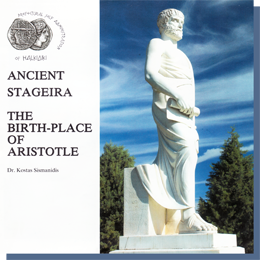 |
"Ancient Stageira
the birthplace of Aristotle"
by Dr. Kostas Sismanidis |
|
Dr. Sismanidis led the first systematic archaeological excavations of Stageira, which began in 1990.
His illustrated 20-page booklet contains a brief history
of Stageira and Olympiada and provides a useful guide
to the main features of the archaeological site.
The booklet includes a plan of the site
and photos of finds which are in the
Archaeological Museum of Polygyros.
Very little has yet been published about
Ancient Stageira, so this excellent booklet
remains the essential guide for the general
visitor as well as those who wish to gain
a deeper understanding of the place. |
| |
Available free in English, German and Greek
from Hotel Germany and Hotel Liotopi, Olympiada. |
| |
|
| |
Stageira &
Olympiada
History
part 6 |
Notes, references and links |
 |
|
31. Justin on Philip II of Macedon
Justin, whose full name is thought to have been Marcus Junianus Justinus, was a Roman historian about whose life nothing is known. Even the dates of his life are uncertain, with various theories placing him somewhere between the 2nd to the end of 4th century AD.
He described his work Historiarum Philippicarum libri XLIV as a selection of extracts - "whatever was most worthy of being known" - (hence the title Epitome) from the 44-volume Historiae philippicae et totius mundi origines et terrae situs, a lost work written by Pompeius Trogus during the reign of Emperor Augustus (ruled 27 BC-14 AD). Historiae philippicae dealt with the rise and fall of the Macedonian monarchy, in particular the exploits of Philip II and his son Alexander the Great, and is also known from quotations used by Pliny the Elder and other writers.
"The states of Greece, while each sought to gain the sovereignty of the country for itself, lost it as a body. Striving intemperately to ruin one another, they did not perceive, till they were oppressed by another power, that what each lost was a common loss to all; for Philip, king of Macedonia, looking, as from a watch-tower, for an opportunity to attack their liberties, and fomenting their contentions by assisting the weaker, obliged victors and vanquished alike to submit to his royal yoke."
Marcus Junianus Justinus, Epitome of the Philippic History of Pompeius Trogus, Book VIII. Translated by Rev. John Selby Watson. Henry G. Bohn, London, 1853. At Corpus scriptorum latinorum, a digital library of Latin literature, forumromanum.org.
32. Plutarch: Philip II appoints Aristotle as tutor to Alexander and rebuilds Stageira
"...[Philip] sent for the most famous and learned of philosophers, Aristotle, and paid him a noble and appropriate tuition-fee. The city of Stageira, that is, of which Aristotle was a native, and which he had himself destroyed, he peopled again, and restored to it those of its citizens who were in exile or slavery."
Plutarch, The Parallel Lives; The Life of Alexander, (Part 1 of 7), chapters 7-8. Translated by Bernadotte Perrin. Loeb Classical Library, Harvard University Press, 1919.
At Bill Thayer's LacusCurtius: Into the Roman World website, University of Chicago.
See more about Plutarch on Alexander the Great and Aristotle in the article on Olympiadas gallery page 5. |
|
|
 |
33. Pliny the Elder: Alexander the Great rebuilds Stageira
"It was the same conqueror, too, who gave directions that the descendants and house of the poet Pindar should be spared, at the taking of Thebes. He likewise rebuilt the native city of Aristotle, uniting to the extraordinary brilliancy of his exploits this speaking testimony of his kindliness of disposition."
Pliny the Elder (23-79 AD), The Natural History, Book 7, chapter 30. Translated by John Bostock, H.T. Riley. Taylor and Francis, London, 1855. At Perseus Digital Library.
The translation of Philemon Holland concurs with that above:
"The same prince, when he took Thebes, commanded that the dwelling-house and family of the poet Pindar should be spared. He refounded the native place (patria) of Aristotle the philosopher; and so mingled a kind testimony for one who threw light on all things in the world."
Pliny's Natural History in thirty-seven books, Volume I; Book VII, chapter 29. A translation on the basis of that by Dr. Philemon Holland, ed. 1601. Printed for the Wernerian Club by G. Barclay, London, 1847-48. At the Internet Archive.
However yet another translation is more vague on the subject:
"Alexander also gave orders at the sack of Thebes for the household and home of the poet Pindar to be spared; and he felt the native place of the philosopher Aristotle to be his own, and blended that evidence of kindliness with all the glory of his exploits."
Pliny's Natural History, Book VII, chapter 29. Translated by H. Rackham, W.H.S. Jones, D.E. Eichholz. Published in 10 volumes by Harvard University Press, Massachusetts and William Heinemann, London, 1949-54. The entire work on one web-page, with a good clear layout, at Jon Lange's fascinating masseiana.org.
See also Pliny's mention of a remarkable white poplar tree in Stageira on Ancient Stageira gallery page 34. |
|
|
 |
34. Plutarch: Aristotle restores Stageira
"And what the pleasures of Aristotle, when he rebuilt his native city Stagira, then levelled with the ground, and brought back its exiled inhabitants?"
Plutarch, Non posse suaviter vivi secundum Epicurum, section 15 (That it is not possible to live pleasurably according to the doctrine of Epicurus). Plutarch's Morals. English translation, edted by William W. Goodwin. Little, Brown, and Company, Cambridge, MA, 1874. At Perseus Digital Library.
"Some there are who blame Callisthenes * for sailing to Alexander in hopes to obtain the rebuilding of Olynthus, as Aristotle had procured that of Stagira."
* Callisthenes of Olynthus (Καλλισθένης, circa 360-328 BC), great nephew of Aristotle, accompanied Alexander on his Asian campaign as an official (embedded) historian. Alexander later had him put in prison where he died.
Plutarch, De Stoicorum repugnantiis, section 20 (Contradictions of the Stoics).
"What value then, think you, would they have put upon it, if they had done such an act as Aristotle did, who procured the restoration and rebuilding of Stagira, the town of his nativity, after it had been destroyed by King Philip?"
Plutarch, Adversus Colotem, section 33 (Against Colotes, disciple and favourite of Epicurus).
All extracts available at Perseus Digital Libray.
Also at Project Gutenberg: Essays and Miscellanies. The Complete Works, Volume 3, by Plutarch. All extracts on one web-page.
35. Diogenes Laertius: Aristotle's part in rebuilding Stageira
Diogenes Laertius (Διογένης Λαέρτιος, Diogenes Laertios, circa 3rd century AD), about whose life nothing is known, was the author of Lives and Opinions of Eminent Philosophers (Βίοι καὶ γνῶμαι τῶν ἐν φιλοσοφίᾳ εὐδοκιμησάντων), one of the most important ancient sources on the history of Greek philosophy.
"Next that he [Aristotle] stayed in Macedonia at Philip's court and received from him his son Alexander as his pupil; that he petitioned Alexander to restore his native city which had been destroyed by Philip and obtained his request; and that he also drew up a code of laws for the inhabitants."
Laertius, Lives of Eminent Philosophers, Book 5, chapter 1, Aristotle. R.D. Hicks. Harvard University Press, Cambridge, MA, 1972 (First published 1925). At Perseus Digital Library.
36. Claudius Aelianus: Aristotle's part in rebuilding Stageira
Claudius Aelianus (Κλαύδιος Αἰλιανός; circa 175-235 AD), usually referred to as Aelian, was a Roman author and teacher of rhetoric, born at Praeneste (today Palestrina), 35 km east of Rome, who flourished during the reign of Emperor Septimius Severus. He is known as the author of two surviving works in Greek, usually referred to by their titles in Latin: De Natura Animalium (On the Nature of Animals; Greek, Περὶ Ζῴων Ἰδιότητος), and Varia Historia (Various History; Greek, Ποικίλη Ἱστορία), which has survived in an abridged form. Both books consist of miscellaneous articles and anecdotes.
Various History, Book 3, chapter 17 is entitled: "That Philosophy is not inconsistent with Political Government, and that some Philosophers have governed Commonwealths."
"Some Philosophers have governed States, though studying onely the good of their own minds they lived privately ... Aristotle, when his Country was not declining, but quite dejected, raised her up again."
Claudius Aelianus, His Various History, Book 3, chapter 17. Translated by Thomas Stanley. Thomas Dring, London, 1665. At James Eason's website, Penelope, University of Chicago.
"Aristotle willing to appease Alexander's Anger, and to quiet him being much incensed, wrote thus to him; 'Rage and Anger is not towards Equals, but towards Superiours; but to you no man is Equal.'
Aristotle advising Alexander in such things as were fit to be done, did benefit many persons; by this means he re-edified his own City, which had been razed by Philip."
Claudius Aelianus, His Various History, Book 12, chapter 54: How Aristotle endeavoured to appease Alexander's Anger (same edition and source).
For some reason, Aelian also considered a law of Stageira worth a mention:
"This was a Law of the Stagirites, truly becoming the Greeks; What you laid not down, take not away."
Claudius Aelianus, His Various History, Book 3, chapter 46: A Law of the Stagirites. |
|
|
 |
37. Dio Chrysostom: Aristotle, "founder of his fatherland"
Dio Chrysostom (Δίων Χρυσόστομος, circa 40-120 AD), an orator from Prusa, Asia Minor.
"And I used to envy Aristotle at times because, being a native of Stageira – Stageira was a village in the territory of Olynthus – and having become the teacher of Alexander and an acquaintance of Philip's after the capture of Olynthus, he brought it about that Stageira was resettled, and they used to say that he alone had had the good fortune to become founder of his fatherland. But meanwhile, quite recently, I came upon a letter in which he exhibits a change of heart and laments, saying that some of these settlers are trying to corrupt, not only the king, but also the satraps who came there, so as to thwart any good outcome and to prevent entirely the resettlement of the city."
Dio Chrysostom, Discourses. 47th Discourse: A Speech in the Public Assembly at Prusa. Translation by J. W. Cohoon and H. Lamar Crosby. Loeb Classical Library, 1946. 5 volumes, Greek texts and facing English translation. Harvard University Press, 1932-1951. At Bill Thayer's LacusCurtius, University of Chicago.
38. Dr. Sismanidis' investigations of the ancient mining area at Stageira
See: Nikos Axarlis, Gold and Aristotle. Archaeology magazine, December 17, 2001. Archaeological Institute of America.
For further references to mining around Stageira - ancient and modern - see note 15 in History Part 3.
39. Muhammad al-Idrisi on Alexander's conquest of Socotra
Abu Abd Allah Muhammad al-Idrisi al-Qurtubi al-Hasani al-Sabti (commonly known as Al Idrisi or Edrisi, 1099–1165/1166), a Moroccan Muslim traveller, geographer, cartographer and Egyptologist, born in Ceuta. He worked at the court of the Norman king Roger II (1095-1154, king of Sicily 1130-1154) in Sicily, where he wrote his geographical compendium Kitab nuzhat al-mushtaq fi'khtiraq al-'afaq (The book of pleasant journeys into faraway lands), known in Latin as De geographia universali.
The translation by Pierre Amédée Jaubert (1779-1847) from Arabic into French:
Géographie d'Édrisi, traduite de l'Arabe en Francais par P. Amédée Jaubert, Tome premier, Premier climat, Sixième Section, pages 45-48. Recueil de voyages et de mémoires, Tome cinquième.
Publié par la Société de Géographie. Chez Arthus Bertrand, Libraire de la Société. l'Imprimerie Royale, Paris, 1836.
Géographie d'Édrisi Volume 1, in French, at googlebooks. |
|
|
|
40. Olympias
Olympias (Ὀλυμπιάς, circa 375-316 BC), also known as Olympiada (Ολυμπιάδα), was an Epirote princess, daughter of the Molossian king Neoptolemus I of Epirus (northwestern Greece). She married Philip in 357 BC. It is said that she was originally named Polyxena (Πολυξένη) but changed her name to Myrtale (Μυρτάλη) before marrying Philip, and that she received the name Olympias after Philip's horse won at the Olympic Games in 356 BC, the same year as Alexander's birth. From around 317 BC, probably following to her victory over Eurydike II of Macedon, she became known as Stratonike (Στρατονίκη) (Plutarch, Moralia 401B).
In the photo above she is depicted on the obverse of a gold medallion struck in the early-mid 3rd century AD, found in Abukir, Egypt in 1902. The reverse side shows a Nereid, possibly Thetis, riding a sea monster, thought to be a reference to Thetis as the mother of the Homeric hero Achilles, and thus associating the mythological figures with Olympias and her son. Olympias' family, the Aeacidae, claimed descent from Neoptolemus, son of Achilles.
These medallions were minted by Roman emperors as gifts for high-ranking officers and officials at the Alexandrian Olympic games, held in Macedonian cities such as Veria (225-250 AD).
Thessaloniki Archaeological Museum. Inv. No. MΘ 4304.
The Bode Museum, Berlin also has several of these medallions, including one of Olympias, three types with different portraits of Alexander and one with a portrait of Emperor Caracalla.
See photos of all five Berlin Abukir medallions on the
Alexander the Great page of the MFP People section. |
|
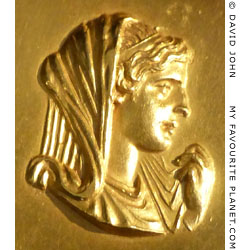
Detail of the Olympias medal
in Thessaloniki Archaeological
Museum. |
|
41. Olympias and Cassander
Kassander (or Cassander; Greek, Κάσσανδρος Ἀντίπατρος, Kassandros Antipatros; circa 350-297 BC), was the son of Antipater, the regent in Macedonia during Alexander the Great's military campaign in Asia. He and Alexander had been fellow pupils of Aristotle, along with Hephaestion, Ptolemy and Leonnatus (see Olympiadas gallery page 5).
Following Alexander's death in 323 BC, a bitter and bloody struggle for power broke out among his successors (known as the Diadochi). Cassander and Olympias became enemies, and he besieged her at Pydna, below Mount Olympus. Olympias finally surrendered after Cassander promised to spare her life, but he had her tried and executed in 316 BC. Having disposed of most of his competition for the regency, in 305 BC Cassander proclaimed himself king of Macedonia.
Pausanias, Description of Greece, Book 9, chapter 7, section 2. At Perseus Digital Library.
Diodorus Siculus, Library, Book XVII, chapter 118, section 2
and Book XIX, chapters 49-51. At Bill Thayer's LacusCurtius, University of Chicago.
Marcus Junianus Justinus, Epitome of the Philippic History of Pompeius Trogus, Book XIV, chapter 6. At forumromanum.org.
Polyaenus, Strategems of War, Book 4: Alexander's generals & others, chapter 11: Cassander, section 3. At websfor.org. |
|
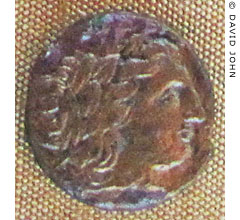
Coin of Cassander
(ruled 316-297 BC).
Pella Archaeological Museum. |
|
 |
42. Olympias' tomb at Pydna?
The tomb inscriptions at Makris Giallos, the site of ancient Pydna, associated with Olympias' family members are discussed by Elizabeth Carney in her book Olympias: Mother of Alexander the Great.
Elizabeth Donnelly Carney, Olympias: Mother of Alexander the Great (Women of the Ancient World). Routledge, 2006. Excerpts at googlebooks.
See also these forum pages at pothos.org: Olympias tomb in Pydna?? and The Tomb of Olympias.
43. Strabo: Stageira deserted by the beginning of the first century BC
"The first city on this [Strymonic] gulf after the harbour of the Acanthians is Stageira, the native city of Aristotle, now deserted; this too belongs to the Chalcidians and so do its harbour, Caprus, and an isle bearing the same name as the harbour."
Strabo, Geography, Book 7, fragments, 36. At Perseus Digital Library.
44. Cassander founds Cassandreia and Thessalonike
Cassandreia was to become one of the most powerful cities of Hellenistic Greece. Cassander is thought to have built the canal across the isthmus of the Pallene peninsula (Παλλήνη) north of Cassandreia (see photo below), as the Persian king Xerxes had through the Athos peninsula (see History part 4). Unlike Xerxes' Canal, the Canal of Potidaia is still in use; it was redug in the 1930s.
The modern village of Neo Potidea (Νέα Ποτίδαια) is near the ancient city and the canal, on the isthmus of the western-most of Halkidiki's three southern pensinsulas (otherwise known as "prongs" or "fingers", see the map of Macedonia on page 1 of this guide). This peninsula, today called Kassandra (Κάσσανδρα), was known in ancient times as Pallene.
It seems odd that the 20th century settlers here (as at Olympiada, also refugees from Turkey in the 1920s) named their new home Nea Potidea, reverting to the pre-Cassandreian name, while the peninsula is still carries the name of the Hellenistic city's founder.
"He also founded on Pallene a city called Cassandreia after his own name, uniting with it as one city the cities of the peninsula, Potidaea, and a considerable number of the neighbouring towns. He also settled in this city those of the Olynthians who survived, not few in number. Since a great deal of land, and good land too, was included within the boundaries of Cassandreia, and since Cassander was very ambitious for the city's increase, it quickly made great progress and became the strongest of the cities of Macedonia."
Diodorus Siculus, Library, Book XIX, chapters 52 and 61, at LacusCurtius, University of Chicago.
See also:
Strabo, Geography, Book 7, fragments, 25. At Perseus Digital Library.
Pausanias, Description of Greece, Book 5, Chapter 23, Section 3. At Perseus Digital Library. |
|
|
| |
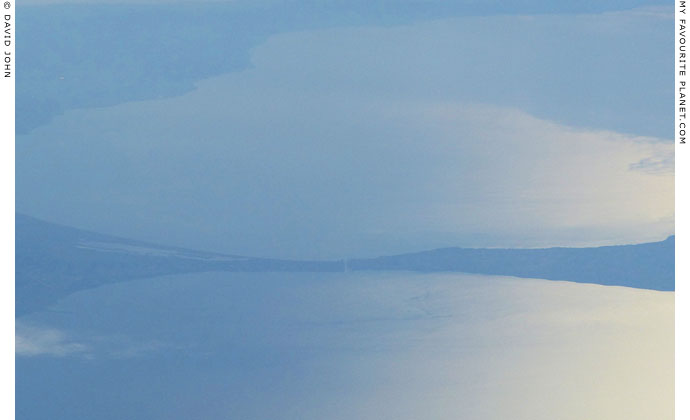
Aerial photo of the Potidea Canal through the Kassandra peninsula, from the west, early morning.
|
The Potidea Canal (Διώρυγα της Ποτίδαιας, Dioryga tis Potidaias) was cut through the narrowest part of the Kassandra peninsula (Κασσάνδρα; ancient name Παλλήνη, Pallene), the westernmost prong of Halkidiki. The canal, around 1.2 kilometres long, 40 metres wide and 8 metres deep, connects the Thermaic Gulf (on which Thessaloniki stands) in the west with the Toronaic Gulf (Τορωναίος Κόλπος, Toroneos Kolpos; also known as Κόλπος Κασσάνδρας, Kolpos Kassandras, the Gulf of Kassandra) in the east.
It runs east to west, immediately north of the modern village of Nea Potidea (Νέα Ποτίδαια) which was built in the 1920s by Greek refugees from northwestern Turkey. The village stands on the site of the ancient Corinthian colony Potidaia (Ποτίδαια), destroyed by King Phillip II of Macedonia in 356 BC, and rebuilt in 316-315 BC by Cassander who renamed it Cassandreia (Κασσάνδρεια, Kassandreia). See the location of Potidaea (Cassandreia) on the map of Halkidiki in History part 8.
It is thought that Cassander also built the canal, although there is no documentary record or archaeological evidence for this. The only ancient mention of the canal is by the geographer Strabo (Στράβων, Strabon; 64/63 BC – circa 24 AD):
"After Thessaloniceia come the remaining parts of the Thermaean Gulf as far as Canastraeum; this is a headland which forms a peninsula and rises opposite to Magnetis. The name of the peninsula is Pallene; and it has an isthmus five stadia in width, through which a canal is cut. On the isthmus is situated a city founded by the Corinthians, which in earlier times was called Potidaea, although later on it was called Cassandreia, after the same King Cassander, who restored it after it had been destroyed."
Strabo, Geography, Book 7, fragments, fragment 25a. At Perseus Digital Library.
Very little archaeological excavation has been undertaken here, although there have been several chance finds. Remains of ancient defensive walls can still be seen on the side of the canal at Nea Potidea. The canal appears to have been in use for some time after Cassander's rule, and it is known to have been used as a defensive barrier by Greek fighters in 1821 during the Greek War of Independence. It was redug 1935-37, and during the construction work archaeologists exploring the area discovered a large amount of varied material, mostly architectural remnants.
See: "POTEIDAIA (Nea Poteidaia) Chalkidike, Greece". Richard Stillwell et al, The Princeton Encyclopedia of classical sites. Princeton University Press, 1976. At Perseus Digital Library. |
|
|
 |
Photos, maps and articles: copyright © David John,
except where otherwise specified.
Additional photos: copyright © Konstanze Gundudis
All photos and articles are copyright protected.
Images and materials by other authors
have been attributed where applicable.
Please do not use these photos or articles without permission.
If you are interested in using any of the photos for your website,
project or publication, please get in contact.
Higher resolution versions are available on request.
My Favourite Planet makes great efforts to provide
comprehensive and accurate information across this
website. However, we can take no responsibility for
inaccuracies or changes made by providers of services
mentioned on these pages. |
| |
 |
Visit the My Favourite Planet Group on Facebook.
Join the group, write a message or comment,
post photos and videos, start a discussion... |
|
|
| |
|
|
| |
| |
 |
| |
 |
| |
 |
| |
 |
| |
George Alvanos
rooms in
Kavala's historic Panagia District
Anthemiou 35,
Kavala, Greece
kavalarooms.gr
|
| |
 |
| |
 |
| |
Olive Garden Restaurant
Kastellorizo,
Greece
+30 22460 49 109
kastellorizo.de
|
| |
Papoutsis
Travel Agency
Kastellorizo,
Greece
+30 22460 49 286
greeklodgings.gr
|
| |
|